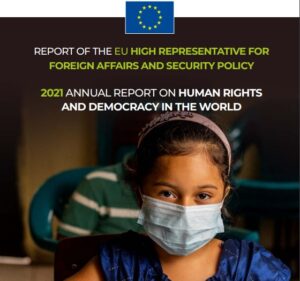 The European Union released its 2021 Annual Report on Human Rights and Democracy in the World on April 19, in which it notes the further worsening of the overall human rights situation in China and the continuing repressive policies implemented in Tibet.
The European Union released its 2021 Annual Report on Human Rights and Democracy in the World on April 19, in which it notes the further worsening of the overall human rights situation in China and the continuing repressive policies implemented in Tibet.
It notes that religious activities continued to take place under the supervision of the Chinese Communist Party and emphasises the Chinese government’s violations of the rights of Uyghurs [the minority ethnic Muslim community of East Turkestan [Ch: Xinjiang], Tibetans and Inner Mongolians, saying that the EU notes that in Tibet the Chinese government continued to implement similar policies as those implemented in East Turkestan, severely limiting Tibetan culture, language and identity.
“Religious practices continue to be heavily controlled by the [Communist Party of China], in line with existing regulations,” the report states. “Detentions, torture and deaths in prison of Tibetan monks and rights activists continued to be reported. Private language schools teaching in Tibetan were closed or asked to start teaching in Mandarin. In July 2021, authorities announced that kindergartens in ethnic minority areas must use Mandarin as teaching language.”
The report also mentions the lack of access to the Tibet Autonomous Region, saying this “was possible only for controlled visits of official delegations or tourist groups.”
 The report is prepared annually by the European External Action Service and provides an overview of EU activities to promote and protect human rights and democracy across the globe. With regard to Tibet, the report summarises the main issues regarding human rights in China as well as summarising the EU’s actions to advance human rights in China. This includes the sanctions taken against four Chinese individuals (including the Tibet Autonomous Region secretary Wang Junzheng) for their involvement in serious human rights violations in East Turkestan, and the continuous calls to China to fulfil its obligations under the United Natopms Charter and international law, as well as under its own constitution.
The report is prepared annually by the European External Action Service and provides an overview of EU activities to promote and protect human rights and democracy across the globe. With regard to Tibet, the report summarises the main issues regarding human rights in China as well as summarising the EU’s actions to advance human rights in China. This includes the sanctions taken against four Chinese individuals (including the Tibet Autonomous Region secretary Wang Junzheng) for their involvement in serious human rights violations in East Turkestan, and the continuous calls to China to fulfil its obligations under the United Natopms Charter and international law, as well as under its own constitution.
In his Foreword to the Report Josep Borrell, the High Representative of the European Union for Foreign Affairs and Security Policy, says the report is “published at a truly extraordinary moment in world history. We see widespread violations of international human rights and international humanitarian law in a scale not witnessed in over 75 years […] For the first time the number of autocratic regimes in the world has exceeded the number of democracies, and nearly 75 percent of the world’s population lived in a country that faced deterioration in 2021.
The Introduction to the Report states “2021 marked the first year of implementation of the EU Action Plan on Human Rights and Democracy, which recommitted the EU and its Member States to use the full range of instruments for the protection and promotion of human rights”. It continues, saying that in 2021, the EU adopted restrictive measures targeting persons and entities from China [and other countries….] concerning restrictive measures against serious human rights violations and abuses, and in the body of the Report it states, “The EU also continued to make its voice heard with public statements and declarations to support human rights defenders at risk (for instance in Vietnam, Russia or China)”.




 Print
Print Email
Email